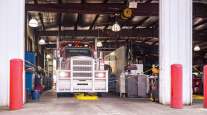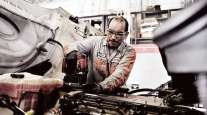Known for Corrosion Expertise, Gambrell Takes TMC Reins
This story appears in the March 7 print edition of Transport Topics.
TAMPA — “If you’d have told me 20 years ago I’d be general chairman, I’d have told you you was crazy,” said Roy Gambrell, incoming general chairman of the Technology & Maintenance Council, who began his career repairing equipment on the family farm.
Gambrell, called “Mr. Rust” by some TMC members for his well-known work on corrosion issues, told Transport Topics he wants more technicians from small- and medium-sized fleets to join TMC.
He was elected general chairman at TMC’s annual meeting here in February.
“My aim is to try and get more small- and medium-sized fleets in there,” Gambrell said. “They need the help. The big companies, they’ve got people on staff. The smaller fleets don’t. [Employees at smaller companies] wear multiple hats. One day, they’re driving a truck; the next day, they’re working [on] a truck.”
Gambrell is director of maintenance for Truck It Inc., a flat-bed carrier based in Franklin, Ky. He lives on a farm outside Portland, Tenn., less than 10 miles south of the Kentucky border.
Gambrell’s most prominent accomplishments at TMC include being chairman of TMC’s S.4 Cab and Controls Study Group and serving on the TMC Board of Directors, most recently as chairman of meetings. He has received the TMC Silver Spark Plug award, which is the highest honor the council bestows.
Gambrell also helped to form TMC’s Corrosion Control Action Committee, an ongoing group dedicated to corrosion issues, which Gambrell says cost the trucking industry billions of dollars a year in prematurely worn out metal components.
He’s been saving truck parts from the junk pile for a long time: Gambrell said that he got hooked on trucks in his younger days from “taking parts off in a junkyard.”
Later, he landed his first official job in the trucking industry in 1967 with a now-vanished leasing company called Matthew’s U-Drive in Nashville, Tenn.
Gambrell came to Matthew’s with a resume consisting mostly of his own mechanical inclination — something he said he developed out of necessity.
“I grew up on a farm” in Tennessee, Gambrell told TT. “We had to work on things” because equipment would break from time to time. Breakdowns weren’t just a hazard for farmers; they were a threat to the family’s livelihood, he said.
Gambrell’s upbringing made a mechanic out of him, but when he left the farm, it “took a while” before anyone let him put a wrench to a truck. In fact, the first thing he put to a truck was a rag — he said he got his start in truck maintenance by “washing them.”
When the trucks were clean at Matthew’s U-Drive and things were slow, Gambrell would “nose around” at the mechanic’s workstation, looking for ways to help the in-house wrench-turner.
“I went from there to apprentice mechanic and then turned into a regular mechanic,” Gambrell told TT.
One of his jobs as a journeyman was as “the road-call guy.” Today, fleets might call that “breakdown services,” he said.
Gambrell recalled that in a sharp contrast with the way business is done today, record keeping during his days as a road-call mechanic was almost nonexistent. Only the very worst accidents were documented at all, Gambrell said.
By the time he attended his first TMC meeting 21 years ago, Matthew’s U-Drive had been bought by Hertz Corp. Hertz’s truck-leasing division was in turn absorbed by Penske Truck Leasing in 1988, by which time Gambrell had been working for Truck It for two years.
As far as he was concerned, he was still just a technician.
“Well,” said Gambrell, “we’re called ‘technicians’ now. When I joined [TMC], they were called ‘mechanics’ or ‘grease monkeys.’ ”
It was as a technician that Gambrell attended his first TMC meeting. His greatest impression of that meeting was the awestruck feeling that very small fish must have when they ride an unfamiliar current into a very big pond.
“I looked around at the guys from [J.B.] Hunt, Arkansas Best [Freight], and I thought, ‘What’s this little old country boy doing in a place like this?’ ”
But Gambrell said he realized that his status as a small-time tinkerer didn’t stop fleet members with much larger companies from talking shop with him.
“They treated me just like I was one of them,” and so he kept returning to TMC, year after year.
Now, he said, “This is my show. . . . It’s truck college for truck people. It kept [Truck It] up on the cutting edge. We were able to make the connections with what’s going on in the industry.”
Gambrell today strives to welcome first-time TMC attendees into the fold with that same warmth he felt years ago. At this year’s meeting, Gambrell applauded loudly, in TMC tradition, whenever first-time attendees at technical sessions took the microphone to ask questions.
“With TMC, you get the recommendation of your peers,” Gambrell said. “So — become a member. Don’t have that ‘deer-in-the-headlight’ look.”
The meeting this year was one of the best-attended in the council’s modern history — about 2,700. Full fleet members, most of whom, but not all, work for some type of motor carrier, totaled about 450, according to the group’s official tally.
“We’d like to have a lot more,” Gambrell said with a shake of his head when TT repeated this statistic to him. “We don’t have as many as we’d like to have.”
Gambrell speculated that perhaps too many prospective TMC members from small- and medium-sized fleets have the same trepidation he felt when he attended his first meeting decades ago.
He realized at that time that “the shade-tree mechanic was going away.” Engines with sophisticated software were rising to prominence and Gambrell, part of a small maintenance staff at a small carrier, recognized that he and his company would need help to cope with the increasingly complex business going on under the hood.
“As far as iron metal, I was pretty good at that,” Gambrell recalled. But electronics and sensor diagnostics were largely a mystery to him. “That was where I was lacking, as far as expertise.”
The technology discussed by the council when Gambrell was a new member is now old hat for the folks who took the baton from those “shade-tree mechanics” of yesteryear.
However, the essential nature of the challenges faced by maintenance professionals at small fleets today is not so different from the paradigm shift Gambrell grappled with as a new member, he said.
Trucks today are not merely engines and transmission systems rigged with seats; with the latest emission and efficiency mandates, big rigs have become chemistry labs bolted to computers superimposed on some of the most efficient diesel power plants the industry has ever known.
“Electronics, more electronics, computerized different things,” Gambrell said, by way of summary.
Small fleets, Gambrell said, are less likely to understand the cutting edge of design and maintenance than their larger competitors because larger fleets — with the buying power they command — have the closest relationships with truck and engine makers.
TMC, Gambrell said, allows small-fleet technicians access to the knowledge base that those larger fleets have built up — if the smaller fleet is willing to join the TMC dialogue.
“If you come up here just expecting to party, this ain’t the place for you,” Gambrell warned. “If you just sit back and don’t do anything, you’re not going to get anything. But if you get involved, you can’t not go back home with something that’ll help your fleet.”




